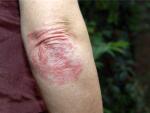6 Myths About Sensitive Skin

Medically Reviewed By William C. Lloyd III, MD, FACS
Written By Erin Azuse, RN on October 2, 2022
-
 Sensitive skin is very common but often misunderstood.Is your skin easily irritated? Do you often experience symptoms like stinging, burning, and redness? Welcome to the club! About half of the population will experience symptoms of sensitive skin, but it can vary greatly from person to person. So, despite its prevalence, there remains a lot of confusion about what causes it, how to diagnose it, and how to treat it. Let’s try to debunk some common myths about sensitive skin.
Sensitive skin is very common but often misunderstood.Is your skin easily irritated? Do you often experience symptoms like stinging, burning, and redness? Welcome to the club! About half of the population will experience symptoms of sensitive skin, but it can vary greatly from person to person. So, despite its prevalence, there remains a lot of confusion about what causes it, how to diagnose it, and how to treat it. Let’s try to debunk some common myths about sensitive skin. -
 Myth #1: Hypoallergenic products are safe to use on sensitive skin.When it comes to sensitive skin care, you may find yourself gravitating toward products with labels that say things like “hypoallergenic” or “all-natural.” But be aware: this doesn’t guarantee your skin won’t have an adverse reaction. The U.S. Food and Drug Administration (FDA) doesn’t regulate the wording or claims made by product manufacturers on their labels. Instead, you should read the list of ingredients carefully to check for any potential irritants. Also, consider doing a patch test, in which you apply a small amount of the product to an area like your forearm and watch for a reaction.
Myth #1: Hypoallergenic products are safe to use on sensitive skin.When it comes to sensitive skin care, you may find yourself gravitating toward products with labels that say things like “hypoallergenic” or “all-natural.” But be aware: this doesn’t guarantee your skin won’t have an adverse reaction. The U.S. Food and Drug Administration (FDA) doesn’t regulate the wording or claims made by product manufacturers on their labels. Instead, you should read the list of ingredients carefully to check for any potential irritants. Also, consider doing a patch test, in which you apply a small amount of the product to an area like your forearm and watch for a reaction. -
-
 Myth #2: Sensitive skin is the result of an allergic reaction.Some cases of sensitive skin occur because of an allergy, but more frequently, it develops because your skin is overreactive, not truly allergic. A reaction can occur in response to something chemical, like an ingredient in a facial product, or it can result from something physical, such as the sun, wind, or extreme temperatures. Sensitive skin can even have psychological triggers, like stress, or occur secondary to other skin conditions, like eczema and rosacea.
Myth #2: Sensitive skin is the result of an allergic reaction.Some cases of sensitive skin occur because of an allergy, but more frequently, it develops because your skin is overreactive, not truly allergic. A reaction can occur in response to something chemical, like an ingredient in a facial product, or it can result from something physical, such as the sun, wind, or extreme temperatures. Sensitive skin can even have psychological triggers, like stress, or occur secondary to other skin conditions, like eczema and rosacea. -
 Myth #3: Sensitive skin is always dry.Dry skin is frequently sensitive. This is because the lack of moisture disrupts the skin’s protective barrier, making it more easily irritated by external things. But other things can disrupt your skin’s barrier, even if you have oily or combination skin. It can be particularly challenging to find skin care products that treat things like acne and blackheads (which are often seen with oily skin) but don’t cause further irritation. A dermatologist can help guide you in the right direction.
Myth #3: Sensitive skin is always dry.Dry skin is frequently sensitive. This is because the lack of moisture disrupts the skin’s protective barrier, making it more easily irritated by external things. But other things can disrupt your skin’s barrier, even if you have oily or combination skin. It can be particularly challenging to find skin care products that treat things like acne and blackheads (which are often seen with oily skin) but don’t cause further irritation. A dermatologist can help guide you in the right direction. -
 Myth #4: Sensitive skin only occurs on the face.The most common place to encounter sensitive skin is on the face, especially around your upper lip, chin and forehead, but most people with sensitive skin also have it on other parts of the body. The scalp is frequently affected with symptoms like itching and dandruff. The hands, feet, neck, torso, and genital area are also prone to sensitivity. If you have sensitive skin, pay careful attention to detergents, body lotions and clothing fabrics; some may be irritating.
Myth #4: Sensitive skin only occurs on the face.The most common place to encounter sensitive skin is on the face, especially around your upper lip, chin and forehead, but most people with sensitive skin also have it on other parts of the body. The scalp is frequently affected with symptoms like itching and dandruff. The hands, feet, neck, torso, and genital area are also prone to sensitivity. If you have sensitive skin, pay careful attention to detergents, body lotions and clothing fabrics; some may be irritating. -
 Myth #5: You either have sensitive skin or you don’t.Sensitive skin can come and go. If you can identify what triggers it, you may be able to alleviate the unpleasant symptoms that go along with it. Start with an evaluation by your doctor. He or she may be able to diagnose and treat an underlying skin condition or do testing to pinpoint a sensitivity to a particular substance. It’s also important to note if you suddenly develop sensitive skin, it’s not always due to a new product. Your body can become sensitive to something you’ve used for months or even years. Factors like aging and changes in your environment can also contribute to the development of sensitive skin.
Myth #5: You either have sensitive skin or you don’t.Sensitive skin can come and go. If you can identify what triggers it, you may be able to alleviate the unpleasant symptoms that go along with it. Start with an evaluation by your doctor. He or she may be able to diagnose and treat an underlying skin condition or do testing to pinpoint a sensitivity to a particular substance. It’s also important to note if you suddenly develop sensitive skin, it’s not always due to a new product. Your body can become sensitive to something you’ve used for months or even years. Factors like aging and changes in your environment can also contribute to the development of sensitive skin. -
-
 Myth #6: You can’t wear makeup if you have sensitive skin.Cosmetics often trigger sensitive skin, but that doesn’t mean you have to remain makeup-free for the rest of your life. Your doctor may recommend not using makeup for a short period and slowly reintroducing products one at a time while assessing for a reaction. Avoid makeup with unnecessary ingredients, use powders in place of creams or lotions, and use makeup that can be cleaned off easily with water. Proper hydration and the use of a physical sunblock, like titanium dioxide, are also helpful in maintaining a good skin protection barrier.
Myth #6: You can’t wear makeup if you have sensitive skin.Cosmetics often trigger sensitive skin, but that doesn’t mean you have to remain makeup-free for the rest of your life. Your doctor may recommend not using makeup for a short period and slowly reintroducing products one at a time while assessing for a reaction. Avoid makeup with unnecessary ingredients, use powders in place of creams or lotions, and use makeup that can be cleaned off easily with water. Proper hydration and the use of a physical sunblock, like titanium dioxide, are also helpful in maintaining a good skin protection barrier.
Sensitive Skin Myths | Sensitive Skin



























